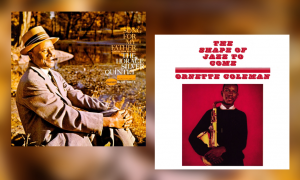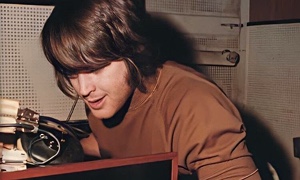Home » Jazz Articles » Building a Jazz Library » Afrobeat: An Alternative Top Ten
Afrobeat: An Alternative Top Ten

The people loved seeing an Englishman in Africa 70. They couldn’t believe it at first. Oyinbo (white man) drummer! They would come and press money on my forehead. It was a mark of approval.
—Ginger Baker
Choosing those albums would be another near impossible task. You could almost draw the titles out of a hat. But most enthusiasts would probably agree that the following selection is a meaningful career overview: Fela Ransome Kuti And Africa 70 With Ginger Baker Live! (Regal Zonophone, 1971), Shakara (EMI, 1972), Gentleman (EMI, 1973), Everything Scatter (Coconut, 1975), Zombie (Coconut, 1976), Sorrow Tears And Blood (Kalakuta, 1977), V.I.P. Vagabonds In Power (Kalakuta, 1979), Original Sufferhead (Lagos International, 1981), Teacher Don't Teach Me Nonsense (Polygram, 1986) and Underground System (Kalakuta, 1992).
It is a truth universally acknowledged, that a man or woman in possession of a good quantity of Fela Kuti albums, must be in want of a lot more. Kuti is the kind of musician who gives completists a good name. But a parallel Afrobeat Top Ten can also hit the spot.
So here are ten signal albums recorded by other musicians. Some are well known, others less so. Followers of the London music scene will note the absence of Ezra Collective, Soothsayers, Cassie Kinoshie's SEED Ensemble and Kokoroko. Excellent bands all of them, who can turn out busting Afrobeat. But none has yet to release a full-length album focused on the style.
Hopefully, you will find one or two new favourites among these discs....
AFROBEAT: A ROAD LESS TRAVELLED
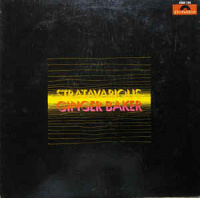 Ginger Baker
Ginger Baker Stratavarious
Polydor, 1972
Ginger Baker and Kuti—who sings and plays keyboards on this album—began their friendship in London in the late 1950s, when Kuti, who was studying trumpet at Trinity College of Music, jammed alongside Baker in Soho jazz clubs. Baker spent the first half of the 1970s based in Lagos, where he built a recording studio and hung out at Kuti's Africa Shrine club. He guested on several Africa 70 albums, including 1971's aforementioned Live! and the equally notable Why Black Man Dey Suffer (African Songs).
Stratavarious is not a "pure" Afrobeat album, but the music, explicitly or implicitly, plays an important role throughout. Kuti's American girlfriend, Sandra Izsadore, a key influence on his burgeoning political awareness, is on backing vocals (she was later a lead singer on Kuti's 1976 Decca album Upside Down). Other guests include the drummers Guy Warren and Remi Kabaka, from Ghana and Nigeria respectively. Stratavarious is one of Baker's greatest albums. Some would say it is his greatest, period.
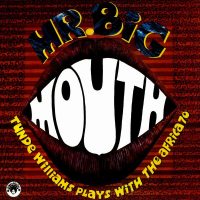 Tunde Williams with Africa 70
Tunde Williams with Africa 70Mr Big Mouth
Afrodisia, 1977
Tunde Williams started out as a drummer and percussionist before switching to trumpet. He joined Kuti's pre-Africa 70 highlife band, Koola Lobitos, in 1967, and stayed with Kuti through Nigeria 70, Africa 70 and Afrika 70 until 1978, when the Afrika 70 breakup which would lead Kuti to form Egypt 80 occurred. He relocated to the US in the mid 1980s.
On Mr Big Mouth, Williams' hard-bop trumpet stretches out on album highlight "The Beginning," a moody, mid-tempo instrumental which includes a seven minute Williams solo. On the title track, Williams puts his horn down to deliver the lead vocal, his lyrics addressing the corruption and fraud rife among the Nigerian power structure.
Mr Big Mouth sits comfortably alongside any Kuti-led album of the 1970s. So too does Low Profile (Not For The Blacks) (Kalakuta) by Williams' band mate, baritone saxophonist Lekan Animashaun. It was recorded with Afrika 70 in Lagos in 1979, tweaked with members of Egypt 80 in Paris in 1986, and finally released in 1995. Animashaun joined Koola Lobitos in 1965 and remained with Kuti until the latter's passing in 1997, taking over as bandleader when Tony Allen quit in 1978. He later became bandleader of the Seun Kuti-led incarnation of Egypt 80.
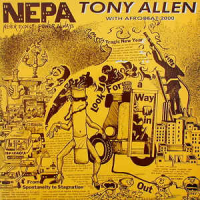 Tony Allen with Afrobeat 2000
Tony Allen with Afrobeat 2000N.E.P.A. Never Expect Power Always
Earthworks, 1984
Tony Allen joined the Fela Ransome Kuti Quintet, a short-lived hard-bop group, in 1964 and stayed with him through Koola Lobitos, Africa 70 and Afrika 70, before leaving at the same time as Williams in 1978. In the 1980s, Allen relocated to Paris, where he was based until passing in April 2020. It was Kuti who created Afrobeat, but Allen's inimitable drumming and signature rhythms played a key role in shaping the music. He was to Afrobeat what Art Blakey was to hard bop.
N.E.P.A. Never Expect Power Always is a wry shout-out to the Nigerian Electric Power Authority, famed in the 1970s and 1980s for keeping the lights off in Lagos almost as often as it kept them on. The album was recorded in London with a multi-national band which included the trumpeters Eddie Tan Tan Thornton and Tunji Omoshebi and trombonist Norris Ridguard, all three of them great players and, sadly, now mostly forgotten. Equally as good are Allen's earlier Jealousy (Soundworkshop, 1975) and Progress (Coconut, 1977), the first recorded with Africa 70, the second with Afrika 70.
We will encounter Allen on three more albums in this Top Ten, beginning with....
 King Sunny Ade and His African Beats
King Sunny Ade and His African BeatsAura
Island, 1984
There was history between Nigerian juju superstar King Sunny Ade and Kuti, who since the early 1970s had been a vocal critic of juju's business model, which relied almost entirely on the patronage of politicians and wealthy business people, an ancient tradition in Nigerian music. Kuti, by contrast, never looked for or received such financial support, relying instead on income from live performances, record releases and the Africa Shrine in order to remain independent and a critic of the Nigerian power structure.
By 1984, Ade was on the way to becoming an international star, heavily invested in by his British label, Island. Aura was the second of two Ade albums—the other was Synchro System (Island, 1983)—which borrowed hefty elements of Kuti's music to create a hybrid juju-afrobeat style of great charm. But, in part because Ade sang in Yoruba rather than Broken English like Kuti, it ultimately failed to deliver the global breakthrough Island were hoping for. Aura's opening track, "Ase," sounds remarkably close to the title track of Kuti's Alagbon Close (Jofabro, 1974). Tony Allen guests on another track. Kuti called Ade a thief for his pains (as he had James Brown a decade earlier). Theft or not, the fusion makes for insinuatingly infectious dance music.
 Antibalas
AntibalasWho Is This America?
Ropeadope, 2004
Founded in Brooklyn in 1998, Antibalas was among the first non-African, politically switched-on, authentic Afrobeat-based ensembles to be formed in Kuti's wake. Much of the success of the 2009 Broadway run of Fela! The Musical derived from Antibalas' onstage performance. Antibalas has the Afrobeat basics down, but it isn't afraid to take liberties with its codification, bringing in well-judged servings of funk and soul.
Who Is This America?, Antibalas' third album, breaks down into three types of track. Extended Kuti-esque lyrics are features of "Who Is This America Dem Speak Of Today?," "Big Man" and "Sister;" Afrika 70-type horns and keyboards are the focus of "Pay Back Africa" and "Indictment;" and on "Obanla'e" and "Elephant," percussionist Ernesto Abreu takes over lead vocals, weaving traditional Yoruba chants into the 21st century NYC mix. Antibalas' Fu Chronicles (Daptone, 2020) is also highly recommended.
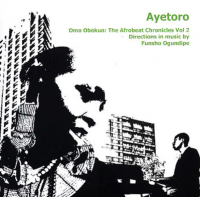 Ayetoro
AyetoroOmo Obokun: The Afrobeat Chronicles Vol 2
Flying Monkey, 2006
Jazz has been one of the most important strands in Afrobeat ever since the style's inception at the close of the 1960s. But convincing instrumental-jazz versions of classic Afrobeat tracks (which effectively means tunes written and recorded by Fela Kuti), or arrangements using the generic Afrobeat paradigm, are rare. Honourable mentions go to the Art Ensemble Of Chicago's steaming interpetation of "Zombie" on Ancient To The Future (DIW, 1987), and more recently to Gard Nilssen's Supersonic Orchestra, whose If You Listen Carefully The Music Is Yours (Odin, 2020) has several passages anchored on Afrobeat grooves.
Other notable jazz explorations are to be found on London-based keyboard player and composer Funsho Ogundipe's series of Afrobeat Chronicles, which morph elegantly between highlife and Afrobeat. The band on the second volume is of special interest because it prominently features the then unknown Shabaka Hutchings on tenor saxophone, bass clarinet and clarinet, as well as the highly regarded Byron Wallen on trumpet. Ogundipe cites Miles Davis among his formative influences and on some tracks the combination of Fender Rhodes and Wallen's miked-up trumpet evokes Davis' early 1970s plugged-in music. More often the vibe suggests the spacey, leisurely melodicism of "Trouble Sleep Yanga Wake Am" from Kuti's Music of Fela: Roforofo Fight (Jofabro, 1972).
Also recommended is Esoterica Galactica: Afrobeat Chronicles Vol 4 (Self Produced, 2014), which features Tony Allen on one track.
 Akoya Afrobeat Ensemble
Akoya Afrobeat EnsembleP.D.P. President Dey Pass
Afrobomb, 2008
New York's Akoya Afrobeat Ensemble formed in 2002 and went off radar around 2016, when it had notched up three albums, of which President Dey Pass was the second. While it burned, Akoya burned brightly. P.D.P. still sounds as good as anything recorded by the better known Antibalas or Chicago Afrobeat Project (see below). The music is authentic in every detail, including the crucial, but often neglected, counterpointing tenor-guitars.
But the musicians stretch the envelope. Bass guitarist Felix Chen, for instance, plays an ostinato on "Fela Dey" which is a close relative of the one played by Boris Gardiner on the Congos' "Congoman" from its Lee Perry-produced, roots-reggae classic Heart Of The Congos (Black Ark, 1977). The Jamaican connection is continued with the inclusion of Gardiner's contemporary and fellow legend, the tenor saxophonist Cedric Im Brooks, who guests on "Je Je L'Aiye." And the horn section sounds Ethiopian going on late period Sun Ra on "B.F.B.F." and resembles noir mode Lalo Schifrin on "Wahala."
Adding to the authentic feel, the sleeve art of P.D.P. was created by Ghariokwu Lemi, who designed around half of Kuti's album covers.
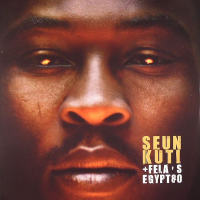 Seun Kuti & Fela's Egypt 80
Seun Kuti & Fela's Egypt 80Many Things
Tôt Ou Tard, 2008
Kuti's eldest son, Femi Kuti, has taken a more revisionist path along the Afrobeat trajectory than has his younger brother Seun Kuti, who is a delightful chip off the old-style block. Many Things, Seun's debut, was produced by Martin Meisonnier, who worked with Fela on a couple of projects in the mid 1980s, and features Fela's last band, Egypt 80 (its lineup including some important Fela-era members, including bandleader Lekan Animashaun).
The album has all Fela's signature strands, spiced with a few twists. Seun's preferred tempos are faster than his father's loping power-shuffle and the tracks are shorter (most last eight or nine minutes rather than Fela's mid and late-period twenty-plus). There is a rocking-out guitar solo on "Don't Give That Shit To Me" and a pronounced touch of desert blues in the tenor guitar riff on "Na Oil." There's even a brief neo-rap section on "African Problems." As a songwriter, Seun is also in the direct line of succession. He wrote five of the seven tunes here and Lekan Animasahun and saxophonist Adedimeji Fagbemi each wrote another. Seun doesn't quite match Fela's genius for a telling metaphor or insult, but his subject matter—poverty, corruption, tribalism, Western economic exploitation—is the same.
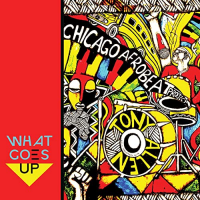 Chicago Afrobeat Project
Chicago Afrobeat ProjectWhat Goes Up
Self Produced, 2017
Chicago Afrobeat Project is the Windy City's answer to Antibalas. Both bands have forged gritty, multi-faceted musical blends with Afrobeat at the core. CAbP is a little younger than Antibalas, having come together in 2002, has less of an international profile (so far) and a shorter discography. What Goes Up is its fourth album and features Tony Allen throughout.
What Goes Up diverges from the instrumental focus of earlier albums by the prominent inclusion of guest vocalists. Song lyrics maintain the Afrobeat tradition of addressing social and political issues, adding ecological concerns to the more familiar subject matter of corrupt and/or inept politicians and an exploitative business class.
The sound on What Goes Up is more polished than on the band's earlier albums, which may not be to everyone's taste. In that context, it is worth remembering that Kuti's sublime Teacher Don't Teach Me Nonsense was a similarly burnished affair, produced by the Compass Point All Stars keyboard player Wally Badarou. What Goes Up Remixed (Future Rootz, 2019) may also ruffle a few feathers, but is a generally successful venture. It feels like CAbP's upward trajectory has a way to go yet.
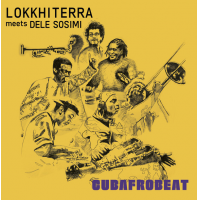 Lokki Terra Meets Dele Sosimi
Lokki Terra Meets Dele SosimiCubafrobeat
Funkiwala, 2018
An album which reconnects Nigerian Yoruba culture with its first overseas diaspora. Lokki Terra was put together by Bangladeshi-born keyboard player Kishon Khan in 2005. Now London-based, Khan lived in Cuba for a while and knows Cuban-Yoruban culture from its source. Keyboard player and vocalist Dele Sosimi was a young-going-on-child-prodigy member of Fela Kuti's Egypt 80, before becoming the founding musical director of Femi Kuti's The Positive Force. Sosimi then relocated to London (where he was born) and set up up Dele Sosimi's Afrobeat Orchestra, which has released five great albums.
Cubafrobeat features Sosimi as lead vocalist on all four tracks (as well as being co-writer on three of them and playing Fender Rhodes on two). But such is the tornado-like impact of the Afrobeat Orchestra in full instrumental flight, that Sosimi is mostly celebrated for his keyboard and arranging talents. That deserves to change. Cubafrobeat was one of three 2018 albums featuring Sosimi as guest vocalist and showcasing the gravitas, air of mystery, intimacy and ferocity his voice can bring to an occasion. The album is a total stonking blinder.
Photo: Dele Sosimi Afrobeat Orchestra at the Jazz Café, London, 2019.
Tags
Building a Jazz Library
Chris May
Fela Anikulapo Kuti
Ezra Collective
Soothsayers
Cassie Kinoshie
SEED Ensemble
Kokoroko
Ginger Baker
Africa 70
Sandra Izsadore
Guy Warren
Remi Kabaka
Tunde Williams
Koola Lobitos
Nigeria 70
Afrika 70
Egypt 8
Lekan Animashaun
Seun Kuti
Tony Allen
Art Blakey
Eddie Tan Tan Thornton
Tunji Omoshebi
Norris Ridguard
Sunny Ade
James Brown
Antibalas
Art Ensemble of Chicago
Gard Nilssen
Funsho Ogundipe
shabaka hutchings
Byron Wallen
Miles Davis
Akoya Afrobeat Ensemble
Chicago Afrobeat Project
Cedric Im Brooks
Sun Ra
Lalo Schifrin
Femi Kuti
Wally Badarou
Kishon Khan
Dele Sosimi
Positive Force
Afrobeat
PREVIOUS / NEXT
Support All About Jazz
 All About Jazz has been a pillar of jazz since 1995, championing it as an art form and, more importantly, supporting the musicians who make it. Our enduring commitment has made "AAJ" one of the most culturally important websites of its kind, read by hundreds of thousands of fans, musicians and industry figures every month.
All About Jazz has been a pillar of jazz since 1995, championing it as an art form and, more importantly, supporting the musicians who make it. Our enduring commitment has made "AAJ" one of the most culturally important websites of its kind, read by hundreds of thousands of fans, musicians and industry figures every month.










